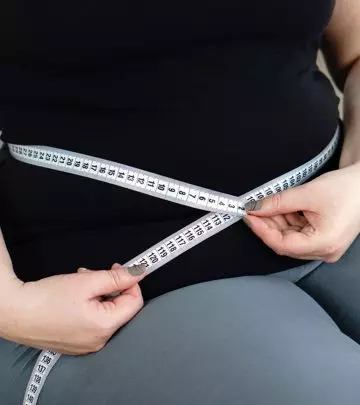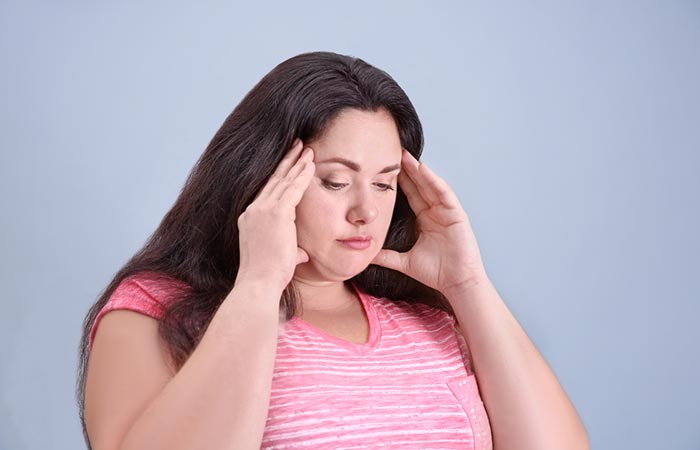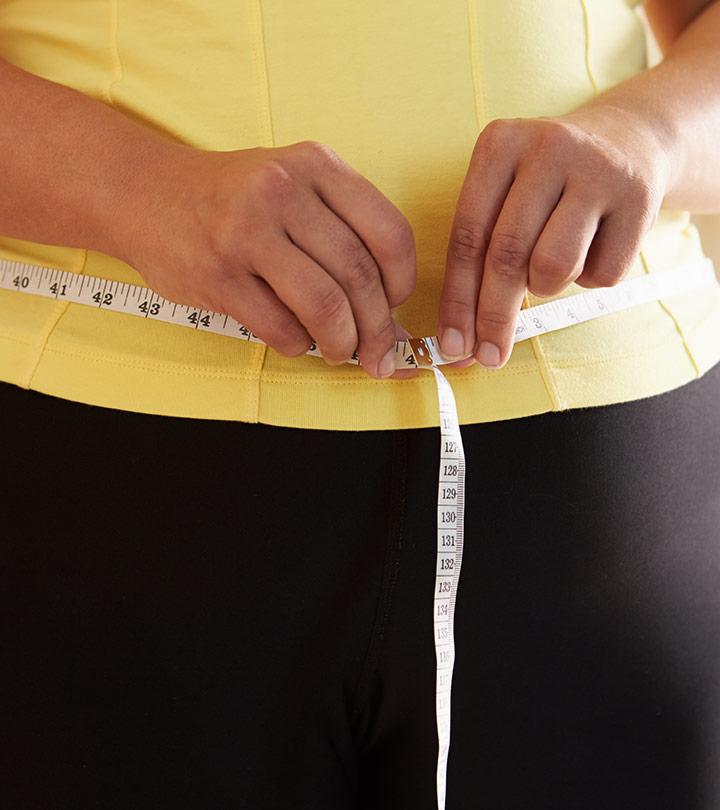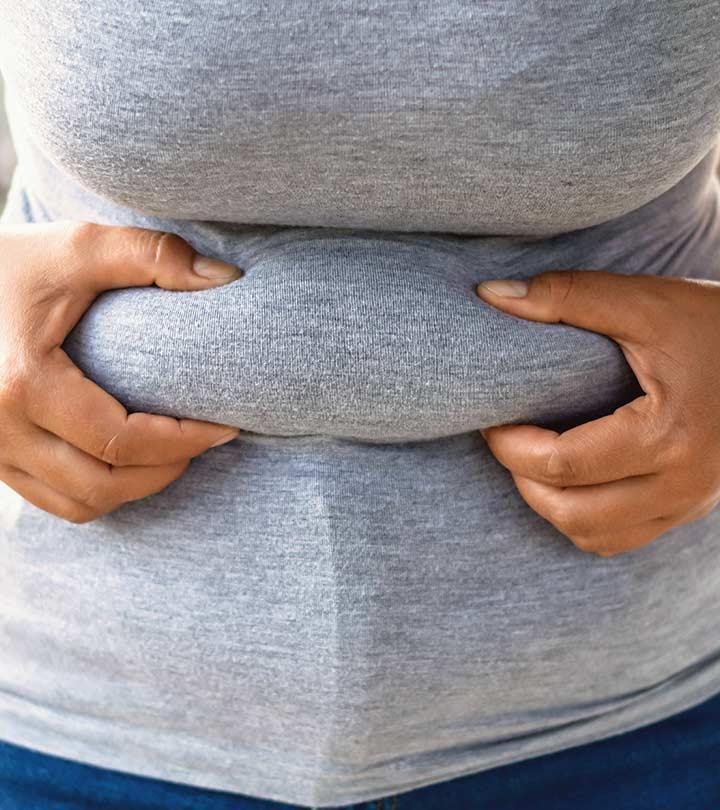Hormones And Weight Gain: Symptoms And Ways To Control
Understand how much influence hormones have on how our bodies function and look.

Image: ShutterStock
There is a direct link between hormones and weight gain. Sudden weight gain and difficulty losing weight could be the symptoms of hormonal weight gain. A balanced diet and exercise alone may not be as effective in such cases. You also must get your hormone levels checked.
Hormones maintaining homeostasis (a self-regulating process that balances bodily functions) helps manage weight, regulates metabolism, and maintains one’s reproductive health (1).
Most women go through hormonal imbalances due to age, genetics, pregnancy, and menopause, leading to weight gain (2). But which hormones are the key players?
Read on to learn more about the hormones linked to weight gain and how they control hunger, satiety, and metabolism.
In This Article
Does Hormonal Imbalance Make You Gain Weight?
Hormones, along with your lifestyle, influence your appetite, satiety, metabolism, and weight (3).
Stress, age, genes, and poor lifestyle choices can disrupt your hormonal balance and lead to a sluggish metabolism, indigestion, and uncontrollable hunger. This, ultimately, leads to weight gain.
This graph indicates the results of a survey conducted by Statista among women in the US aged 35 years and older. Around 60 percent of women reported that the impact of declining hormone levels in women as they age was not discussed enough.
Lack Of Discussion Around Hormonal Changes In Women
Source: StatistaSo, let’s find out which hormones cause weight gain.
Which Hormone Imbalances Trigger Weight Gain?
1. Thyroid
The thyroid gland is a butterfly-shaped gland present at the base of the neck. It is responsible for releasing three hormones – triiodothyronine (T3), thyroxine (T4), and calcitonin (4).
T3 and T4 are mainly responsible for regulating the body temperature and metabolism. They also play a major role in regulating fat and glucose metabolism, food intake, and fat oxidation (the process of breaking down fat molecules) (5), (6).
Imbalances in the thyroid hormones cause a medical condition called hypothyroidism (under-active thyroid gland). Hypothyroidism is associated with decreased metabolic rate and body temperature and a higher BMI (6).
Mild thyroid dysfunction can lead to weight gain and is a possible risk factor of obesity (6).
Hypothyroidism leads to water accumulation, and not fat, that makes you look plump. Severe hypothyroidism can lead to edema (water accumulation in the face) (7). You can gain 5-10 pounds or more if your weight gain is only due to thyroid hormone imbalance.
A healthy lifestyle can lead to weight loss and improve your body composition and thyroid function (8).
2. Leptin
Leptin is mainly secreted by fat cells (adipocytes). It regulates energy expenditure, appetite, and food intake (9), (10).
Your lifestyle and diet play a key role in regulating the leptin levels and your body weight. A study conducted on rats found that eating processed and fast foods, sugar-sweetened beverages, and too much fructose can lead to leptin resistance and, consequently, obesity (11).
As you keep consuming more fructose-containing foods, more fat gets accumulated and more leptin is secreted. This, in turn, desensitizes your body to leptin and your brain stops receiving the signal to stop eating. This, ultimately, leads to weight gain (12).
3. Insulin
Insulin, a peptide hormone secreted by the beta cells of the pancreas, regulate blood glucose levels.
Nutritional imbalance, physical inactivity, and overconsumption of processed foods, alcohol, and artificially sweetened drinks, and snacking on unhealthy foods can lead to obesity and insulin resistance.
Insulin resistance increases the secretion of endogenous insulin (the insulin secreted by the pancreas), which leads to weight gain by altering the metabolism of glucose (13).
Lifestyle management, monitoring your hormonal levels, and exercise are essential to prevent insulin-resistant obesity.
4. Ghrelin
Ghrelin is an orexigenic (hunger-stimulant) hormone that stimulates your appetite and food intake and increases fat deposition.
It is secreted by the stomach mainly in response to food. Your stomach secretes ghrelin when it is empty and decreases its production shortly after a meal (14).
After a meal, the ghrelin suppression rate is lower in obese individuals compared to individuals with a normal BMI. This results in overeating, which leads to further weight gain (15).
5. Estrogen
Both high and low levels of estrogeni XSex hormones in women that help develop and maintain secondary sexual characteristics and the reproductive system. can lead to weight gain among women.
High levels of estrogen promote fat deposition, whereas low levels (especially during menopause) result in visceral fati XThe accumulation of fat around the stomach, liver, and intestines, as well as other abdominal organs that can lead to a heart attack. accumulation, especially in the lower region (16).
Studies have shown that increased secretion of estrone, estradiol, and free estradiol are all associated with increased BMI in postmenopausal women (17).
The level of estrogen is negatively associated with total physical activity. The more physically active you are during menopause, the more you can control your weight gain (18).
6. Cortisol
Cortisol is a steroid hormone produced by the adrenal glands. It is mainly secreted when you are stressed, depressed, anxious, nervous, angry, physically injured, etc.
Consumption of foods with a high glycemic indexi XFoods are given a glycemic index score depending on how quickly and profoundly they can cause a spike in blood glucose levels. , chronic stress, and lack of sleep lead to an increase in cortisol production. A high cortisol level causes fat accumulation in the abdominal region. This vicious cycle is one of the major causes of weight gain (19), (20).
 Quick Tip
Quick Tip7. Testosterone
Testosterone is a male sex hormone, but it is also secreted to a small extent by the ovaries in women.
Testosterone helps burn fat, strengthens bones and muscles, and improves libidoi XAn individual's desire to engage in sexual activities. Conditions such as menopause, stress and pregnancy can affect it. (21). Insulin resistance due to increased adipose tissue leads to low circulation of the sex-hormone-binding globulin (SHBG) (a protein that binds sex hormones). This causes a reduction in the testosterone level and an increase in fat accumulation (22). The excess secretion of testosterone in women causes polycystic ovarian syndrome (PCOS), which may lead to weight gain (23).
Lifestyle changes, testosterone therapy, and regular exercise can help maintain this hormone and lead to weight loss.
8. Progesterone
This female reproductive hormone helps maintain bodily functions and manage reproductive health.
Progesterone hormone levels drop during menopause, acute stress, and use of contraceptive pills.
A study conducted on hamsters found that a normal progesterone level helps lower fat mass (24).
Another study conducted on humans concluded that estrogen-progesterone therapy helps reduce abdominal fat accumulation, improves insulin sensitivity, and slows the progression of type-2 diabetes (25).
Regular exercise, stress management, and a healthy lifestyle can help regulate your progesterone levels and weight gain.
9. Melatonin

Melatonin is a hormone secreted by the pineal gland. It regulates the circadian rhythm, i.e., the sleeping and rising pattern. Melatonin levels in the body tend to rise from evening till late at night and ebb in the early morning (26).
Poor sleep quality or sleep deprivation lowers the melatonin level, which leads to lower physical activity, induces stress, and stimulates the production of cortisol (a stress hormone). This increases glucose metabolism and decreases the adiponectin level (a protein hormone that promotes fat breakdown), which causes weight gain (27), (28).
Low melatonin levels and poor sleep quality increase calorie intake at night, which is again related to weight gain and increased BMI (29).
10. Glucocorticoids
Glucocorticoids are steroid hormones that regulate insulin sensitivity and fatty acid synthesis. An imbalance in the glucocorticoid levels causes weight gain and insulin resistance.
A study conducted on rats found that the central administration of glucocorticoids increases food intake and body weight gain (30).
Now that you know which hormones trigger weight gain, let’s check out the symptoms that you need to look out for.
Symptoms Of Hormonal Weight Gain
The most common symptom of hormonal imbalance is weight gain, which may lead to:
- Lethargy
- Tiredness
- Difficulty in sleeping
- Headache
- Depression
- Indigestion
- Change in appetite
- Dry skin
- Puffy face
- Anxiety
- Sexual dysfunction
So, consult a doctor if you face any of the above symptoms and go for a routine hormonal check-up for proper management.
Let’s answer another common question that people have about hormonal weight gain.
Does Hormone Replacement Therapy (HRT) Cause Weight Gain?
Not all hormonal therapy leads to weight gain. Hormones that are steroidal in nature may cause central fat accumulation, but the evidence to support this is variable and not conclusive.
A study published in Fertility and Sterility found that postmenopausal women who were on estrogen and progestin treatment experienced an increase in body weight and fat mass to a small extent (31).
A few studies also state that continuous hormonal therapy does not cause any significant changes in weight (32), (33).
So, check with a doctor if you are experiencing weight gain. Getting a full profile hormonal test done periodically can help you control your weight.
Here’s what you can do to lose the weight caused by hormonal imbalance.
How To Lose Hormonal Weight Gain
The best way to control your hormonal imbalance is through regular check-ups, lifestyle management, and medication for the same. Here’s what you can do to control your weight at this time.
- Get blood tests done if you are experiencing unwanted weight gain.
- Avoid eating processed food, alcohol, late-night snacks, aerated and artificially sweetened drinks, etc.
- Sleep properly and peacefully. Studies have shown that short sleep duration increases ghrelin and lowers leptin in the body, which results in weight gain (34).
- Keep yourself hydrated to stay healthy.
- Fill your plate with lots of fresh vegetables, whole grains, and fruits.
- Exercise regularly and burn more calories.
- Dedicate an hour every day to practice deep breathing, yoga, and meditation to reduce stress.
Leading a healthy lifestyle seems to help with hormonal weight gain. However, some wonder if intake of birth control pills causes weight gain. Learn further about it in the next section.
Do Birth Control Pills Cause Weight Gain?
Many people seem to struggle with weight fluctuations when taking birth control pills. Research shows that certain types of birth control pills, like progestin-only contraceptives, may lead to weight gain (35). While some studies show moderate to low weight gain, other multi-year studies suggest a higher weight gain after 2 to 3 years from taking the pill. In yet another study, oral contraceptives were found not to cause weight gain in girls below the age of 18, even if they were obese (36). Research in this regard seems to be mixed. Hence, consult your doctor for more information.
A blogger shared her struggle with hormonal imbalance after going off hormonal birth control pills. She wrote, “Not long after, a whole village of pimples decide to reside on my chin, my hair suddenly looked like Olivia Newton-John’s from “Grease,” my mood swings were harsh, my periods were excruciating, and my weight was all over the place (i).”
 Quick Tip
Quick TipHormonal imbalances can obstruct your weight loss journey. Hormones and weight gain share a direct connection as hormones are essential for the proper functioning of the body. Imbalanced hormone levels may lead to health complications, including unwanted weight gain. You may regulate your hormonal levels naturally by following a healthy, balanced diet and a disciplined exercise regimen. Keep an eye on your hormonal profile every three months to check if additional intervention is needed. Consult your health care provider if you are experiencing trouble losing weight despite adopting a healthy lifestyle.
Frequently Asked Questions
How do I get rid of hormonal belly fat?
If you have hormonal belly fat, get your insulin and steroid levels checked. Eat healthily, exercise regularly, and take proper medication if detected with any hormonal imbalance.
Which hormone helps you lose weight?
If you have proper control over the hunger-satiety hormones, i.e., ghrelin and leptin, you can maintain your weight easily.
Can I gain hormonal weight after age 50?
If you are going through menopause or are peri-menopausal, you gain can weight after 50. Estrogen is the hormone that regulates your weight at this time. Due to menopause, your estrogen level drops, which causes fat accumulation around your belly and lower abdomen.
What is the hormone reset diet?
The hormone reset diet aims to correct hormonal imbalances and reduce weight by eliminating meat, alcohol, gluten grains, high fructose fruits, and dairy products from one’s diet.
How do you check your hormone levels?
You can check your hormone levels through regular blood checkups.
Key Takeaways
- Hormones like estrogen, testosterone, progesterone insulin, cortisol, melatonin, and ghrelin help balance weight gain.
- Weight gain can cause you to become lethargic, tired, depressed, and anxious. They also result in headaches, indigestion, dry skin, puffy face, and sexual dysfunction.
- Hormones can help regulate your weight and metabolism, and maintain your reproductive health. Hence, hormonal imbalances in your body occurring due to age, genetics, pregnancy, and menopause, can also lead to weight gain.
- Eating healthy, staying hydrated, exercising regularly, and reducing stress can help balance hormone levels and reduce weight gain.
Feeling overwhelmed? Learn how stress, hormones, and weight gain are connected and how to manage them. Watch now and empower yourself with effective strategies!
Personal Experience: Source
StyleCraze's articles are interwoven with authentic personal narratives that provide depth and resonance to our content. Below are the sources of the personal accounts referenced in this article.
i. I Balanced my Hormones Naturally — Here are the Top 3 Things that Worked for Me.https://medium.com/elephantspirituality/i-balanced-my-hormones-naturally-here-are-the-top-3-things-that-worked-for-me-f5224a1ccaef
References
Articles on StyleCraze are backed by verified information from peer-reviewed and academic research papers, reputed organizations, research institutions, and medical associations to ensure accuracy and relevance. Read our editorial policy to learn more.
- Physiology, endocrine hormones, US National Library of Medicine, National Institutes of Health.
https://www.ncbi.nlm.nih.gov/books/NBK538498/ - Lovejoy, J C. “The influence of sex hormones on obesity across the female life span.” Journal of women’s health vol. 7,10 (1998): 1247-56.
https://pubmed.ncbi.nlm.nih.gov/9929857 - Schwarz, Neil A et al. “A review of weight control strategies and their effects on the regulation of hormonal balance.” Journal of nutrition and metabolism vol. 2011 (2011): 237932. doi:10.1155/2011/237932
https://www.ncbi.nlm.nih.gov/pmc/articles/PMC3147122/ - Physiology, thyroid hormone, US National Library of Medicine, National Institutes of Health.
https://www.ncbi.nlm.nih.gov/books/NBK500006/ - How does the thyroid gland work? Institute for Quality and Efficiency in Health Care, US National Library of Medicine, National Institutes of Health.
https://www.ncbi.nlm.nih.gov/books/NBK279388/ - Sanyal, Debmalya, and Moutusi Raychaudhuri. “Hypothyroidism and obesity: An intriguing link.” Indian journal of endocrinology and metabolism vol. 20,4 (2016): 554-7. doi:10.4103/2230-8210.183454
https://www.ncbi.nlm.nih.gov/pmc/articles/PMC4911848/ - Kinoshita, Hiroyuki et al. “Severe hypothyroidism associated with the degree of edema in a patient with nephrosis.” Clinics and practice vol. 1,3 e78. 13 Oct. 2011, doi:10.4081/cp.2011.e78
https://www.ncbi.nlm.nih.gov/pmc/articles/PMC3981359/ - Radetti, G et al. “Changes in lifestyle improve body composition, thyroid function, and structure in obese children.” Journal of endocrinological investigation vol. 35,3 (2012): 281-5. doi:10.3275/7763
https://pubmed.ncbi.nlm.nih.gov/21623157 - Ahima, Rexford S. “Revisiting leptin’s role in obesity and weight loss.” The Journal of clinical investigation vol. 118,7 (2008): 2380-3. doi:10.1172/JCI36284
https://www.ncbi.nlm.nih.gov/pmc/articles/PMC2430504/ - Izadi, Vajiheh et al. “Dietary intakes and leptin concentrations.” ARYA atherosclerosis vol. 10,5 (2014): 266-72.
https://www.ncbi.nlm.nih.gov/pmc/articles/PMC4251481/ - Shapiro, Alexandra et al. “Fructose-induced leptin resistance exacerbates weight gain in response to subsequent high-fat feeding.” American journal of physiology. Regulatory, integrative and comparative physiology vol. 295,5 (2008): R1370-5. doi:10.1152/ajpregu.00195.2008
https://pubmed.ncbi.nlm.nih.gov/18703413 - Ahima, Rexford S. “Revisiting leptin’s role in obesity and weight loss.” The Journal of clinical investigation vol. 118,7 (2008): 2380-3. doi:10.1172/JCI36284
https://www.ncbi.nlm.nih.gov/pmc/articles/PMC2430504/ - Insulin Resistance, US National Library of Medicine, National Institutes of Health.
https://www.ncbi.nlm.nih.gov/books/NBK507839/ - Cummings, D E et al. “A preprandial rise in plasma ghrelin levels suggests a role in meal initiation in humans.” Diabetes vol. 50,8 (2001): 1714-9. doi:10.2337/diabetes.50.8.1714
https://pubmed.ncbi.nlm.nih.gov/11473029 - Makris, Marinos C et al. “Ghrelin and Obesity: Identifying Gaps and Dispelling Myths. A Reappraisal.” In vivo (Athens, Greece) vol. 31,6 (2017): 1047-1050. doi:10.21873/invivo.11168
https://www.ncbi.nlm.nih.gov/pmc/articles/PMC5756630/ - Brown, L M, and D J Clegg. “Central effects of estradiol in the regulation of food intake, body weight, and adiposity.” The Journal of steroid biochemistry and molecular biology vol. 122,1-3 (2010): 65-73. doi:10.1016/j.jsbmb.2009.12.005
https://www.ncbi.nlm.nih.gov/pmc/articles/PMC2889220/ - Cleary, Margot P, and Michael E Grossmann. “Minireview: Obesity and breast cancer: the estrogen connection.” Endocrinology vol. 150,6 (2009): 2537-42. doi:10.1210/en.2009-0070
https://www.ncbi.nlm.nih.gov/pmc/articles/PMC2689796/ - McTiernan, Anne et al. “Relation of BMI and physical activity to sex hormones in postmenopausal women.” Obesity (Silver Spring, Md.) vol. 14,9 (2006): 1662-77. doi:10.1038/oby.2006.191
https://pubmed.ncbi.nlm.nih.gov/17030978 - . van der Valk, Eline S et al. “Stress and Obesity: Are There More Susceptible Individuals?.” Current obesity reports vol. 7,2 (2018): 193-203. doi:10.1007/s13679-018-0306-y
https://www.ncbi.nlm.nih.gov/pmc/articles/PMC5958156/ - Rossum, Elisabeth F.C. van. “Obesity and Cortisol: New Perspectives on an Old Theme.” Wiley Online Library, John Wiley & Sons, Ltd, 23 Feb. 2017, onlinelibrary.wiley.com/doi/full/10.1002/oby.21774.
https://onlinelibrary.wiley.com/doi/full/10.1002/oby.21774 - Physiology, testosterone, US National Library of Medicine, National Institutes of Health.
https://www.ncbi.nlm.nih.gov/books/NBK526128/ - Fui, Mark Ng Tang et al. “Lowered testosterone in male obesity: mechanisms, morbidity and management.” Asian journal of andrology vol. 16,2 (2014): 223-31. doi:10.4103/1008-682X.122365
https://www.ncbi.nlm.nih.gov/pmc/articles/PMC3955331/ - Teedde Helena et al. “Longitudinal Weight Gain in Women Identified With Polycystic Ovary Syndrome: Results of an Observational Study in Young Women.”ResearchGate August 2013 Obesity 21(8)
https://www.researchgate.net/publication/244482415_Longitudinal_Weight_Gain_in_Women_Identified_With_Polycystic_Ovary_Syndrome_Results_of_an_Observational_Study_in_Young_Women - Bhatia A J and G N Wade. “Progesterone can either increase or decrease weight gain and adiposity in ovariectomized Syrian hamsters.” Physiology & behavior vol. 462 (1989): 273-8. doi:10.1016/0031-9384(89)90267-9
https://pubmed.ncbi.nlm.nih.gov/2602469 - “Understanding Weight Gain at Menopause.” Taylor & Francis
https://www.tandfonline.com/doi/full/10.3109/13697137.2012.707385 - Grivas Theodoros B and Olga D Savvidou. “Melatonin the “light of night” in human biology and adolescent idiopathic scoliosis.” Scoliosis vol. 2 6. 4 Apr. 2007 doi:10.1186/1748-7161-2-6
https://www.ncbi.nlm.nih.gov/pmc/articles/PMC1855314/ - Gupta Neeraj K et al. “Is obesity associated with poor sleep quality in adolescents?.” American journal of human biology : the official journal of the Human Biology Council vol. 146 (2002): 762-8. doi:10.1002/ajhb.10093
https://pubmed.ncbi.nlm.nih.gov/12400037 - Patel Sanjay R and Frank B Hu. “Short sleep duration and weight gain: a systematic review.” Obesity (Silver Spring Md.) vol. 163 (2008): 643-53. doi:10.1038/oby.2007.118
https://www.ncbi.nlm.nih.gov/pmc/articles/PMC2723045/ - Greer Stephanie M et al. “The impact of sleep deprivation on food desire in the human brain.” Nature communications vol. 4 (2013): 2259. doi:10.1038/ncomms3259
https://www.ncbi.nlm.nih.gov/pmc/articles/PMC3763921/ - Veyrat-Durebex Christelle et al. “Central Glucocorticoid Administration Promotes Weight Gain and Increased 11β-Hydroxysteroid Dehydrogenase Type 1 Expression in White Adipose Tissue.” PLOS ONE Public Library of Science journals.plos.org/plosone/article?id=10.1371/journal.pone.0034002.
https://journals.plos.org/plosone/article?id=10.1371/journal.pone.0034002 - Reubinoff B E et al. “Effects of hormone replacement therapy on weight body composition fat distribution and food intake in early postmenopausal women: a prospective study.” Fertility and sterility vol. 645 (1995): 963-8. doi:10.1016/s0015-0282(16)57910-2
https://pubmed.ncbi.nlm.nih.gov/7589642 - Guthrie J R et al. “Weight gain and the menopause: a 5-year prospective study.” Climacteric : the journal of the International Menopause Society vol. 23 (1999): 205-11. doi:10.3109/13697139909038063
https://pubmed.ncbi.nlm.nih.gov/11910598 - Norman R J et al. “Oestrogen and progestogen hormone replacement therapy for peri-menopausal and post-menopausal women: weight and body fat distribution.” The Cochrane database of systematic reviews 2 (2000): CD001018. doi:10.1002/14651858.CD001018
https://pubmed.ncbi.nlm.nih.gov/10796730 - Taheri Shahrad et al. “Short sleep duration is associated with reduced leptin elevated ghrelin and increased body mass index.” PLoS medicine vol. 13 (2004): e62. doi:10.1371/journal.pmed.0010062
https://www.ncbi.nlm.nih.gov/pmc/articles/PMC535701/ - Progestin‐only contraceptives: effects on weight
https://www.cochranelibrary.com/cdsr/doi/10.1002/14651858.CD008815.pub4/full - Combined oral contraceptives’ influence on weight, body composition, height, and bone mineral density in girls younger than 18 years: A systematic review
https://www.tandfonline.com/doi/full/10.3109/13625187.2012.692411 - Koelsch Stefan et al. “Effects of music listening on cortisol levels and propofol consumption during spinal anesthesia.” Frontiers in psychology 2 (2011): 58.
https://pubmed.ncbi.nlm.nih.gov/21716581/





















